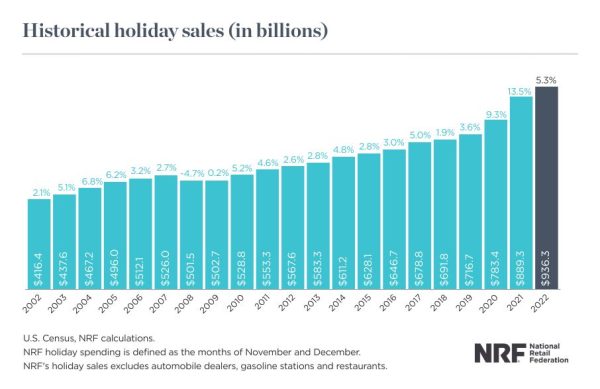In recent years, the holiday season has become less and less about family, love, or giving thanks and is instead increasingly centered on gift-giving. Consumerist and commercialized holidays are nothing new, in fact, it’s easy to argue that these are the values America was built on. In his book “Land of Desire: Merchants, Power, and the Rise of a New American Culture”, William Leach said, “The cardinal features of this culture were acquisition and consumption as the means of achieving happiness.” In simpler terms, he believes that American culture equates material things with happiness. In a world where celebrities and influencers with picturesque, maximalist lives are being forced on society, the urge to buy as much as possible is only natural.
After all, what is Christmas without presents? And who can resist a good deal? Throughout the holiday season, it’s important to remain mindful when shopping and remember that presents and material things aren’t everything.
That’s not to say it’s wrong to enjoy giving or receiving presents from your loved ones. The problem arises when that becomes the main focus of the holidays. With attractive marketing and hundreds of options available, it’s easy to get carried away when shopping, especially now after the rise of online shopping where you’re able to buy any number of items without leaving your couch. According to the U.S. Census, 14.9% of all sales in 2023 so far have been online, compared to 7.3% in 2015. This rapid, no-contact method of shopping makes it easier to mindlessly spend money without stopping to think about whether you actually need this item or if you can even afford it. “I know a lot of people that buy a lot of stuff they don’t need just because it’s cheaper, not because they actually have stuff that they want,” Maya Zaslavsky, a sophomore at IBW said. This mindset is only amplified during Black Friday and Christmas. This year, $9.8 billion was spent just online during Black Friday. This was a new record and a 7.5% increase from last year, according to Adobe Analytics.

On top of that, the National Retail Federation (NRF) says that sales during November and December grew 5.3% to $936.3 billion in 2022, with a 13.5% increase the year before. This rise in spending can be in part due to inflation, however, inflation rates do not match those of sales and it’s fair to say that there is still a rise in sales. This constant rise in spending is by no means sustainable and does not match any rise in income. Something needs to give.
If you are looking to practice looking to create a less consumerist environment this holiday season, it’s important to remain mindful while shopping. Focus on giving meaningful and personal gifts.















